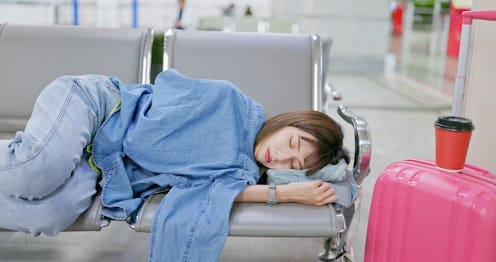Life
7 Times You Should Avoid Taking A Nap

Naps can sometimes be essential, not only because it feels good to sleep when you're tired, but because a short nap can help boost your energy and even improve your brain power. But there are some times when you should never take a nap no matter how badly you want it, as it could end up making you feel worse, mess up your sleep schedule, or even hinder your performance. Knowing when it's okay to take a nap can help you keep a consistent schedule to maximize your health and wellbeing.
"Everyone asks about naps," says Annmarie Belmonte, PsyD, a member of the Society of Behavioral Sleep Medicine, over email. "If you don't have insomnia (an inability to fall asleep, stay asleep or wake up too early), then it’s perfectly fine to take a nap. However, there are some situations where you would not want to nap or napping may be suggestive of other sleep diagnosis."
To make sure you strike the perfect balance between feeling well-rested and maintaining a normal sleep schedule, you'll want to be selective about when you nap. Here are seven times that you should never take a nap, no matter how much you have the urge.
1In The Morning
"You should never take a nap at any time of the day other than 12:00 to 3:00 in the afternoon," says Dr. Robert Oexman, Director of The Sleep to Live Institute, over email. "This coincides with the normal circadian rhythm. Napping at any other time may make it more difficult to sleep at night."
2In The Late Afternoon Or Evening
The same logic applies here. If you need a nap, opt for one early in the afternoon rather than later. "Never nap during the day or evening if you are having a difficult time falling asleep, maintaining sleep, or waking too early in the morning," says Oexman. "Napping can take away from some of the drive to sleep at night. The exception to this would be if you must do some work that requires concentration like driving, health care work, etc."
3When You're Crossing Time Zones & Arrive In The Afternoon
It's hard to stay awake after a long day of travel once the jet lag kicks in, but avoid napping right away, or you'll end up regretting it later. "If you are traveling across multiple time zones you should not nap during the day when you arrive at your destination," says Oexman. "Your normal circadian rhythm will recover faster if you avoid napping. Get out and get some form of exercise in the sun shine when you arrive."
4Right Before Something That Requires Your Concentration
If you have an activity that requires your full alertness, avoid napping right before it. "Awakening from naps can give rise to transient grogginess and impairment of performance, a condition referred to as sleep inertia," says sleep expert Dr. Teofilo L. Lee-Chiong Jr. over email. If you're doing something like driving, this could increase your risk of an accident.
5If You Have Insomnia
Napping with insomnia might help you feel like you can finally get some shut eye, but it just perpetuates the cycle, preventing you from falling asleep later on. "It can decrease your sleep drive and prevent you from sleeping at night," says Belmonte.
6If You've Already Slept All Night
Don't just crawl into bed if you find yourself wanting to nap after you have slept all night. "You need to pay attention to this symptom, because if this occurs frequently, is accompanied by snoring, gasping for air or choking in the night, it could be a symptom of Sleep Apnea," says Belmonte. If you find that you're constantly tired after a full night's rest, you'll want to get checked by a doctor.
7If It's Longer Than 20 Minutes
A quick power nap is okay, but avoid sleeping for long periods of time. "Napping longer than 15 to 20 minutes should also be avoided so you will not drop into deeper stages of sleep and waking feeling worse than when you took the nap," says Oexman.
This article was originally published on